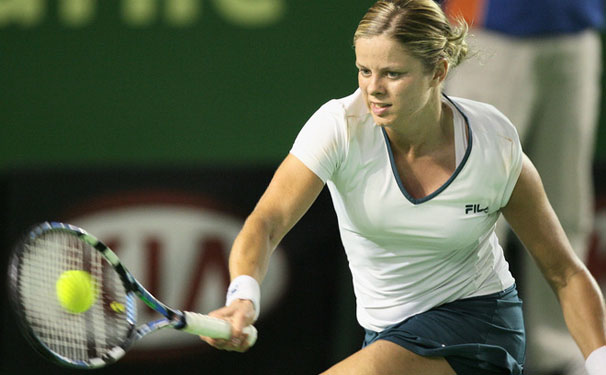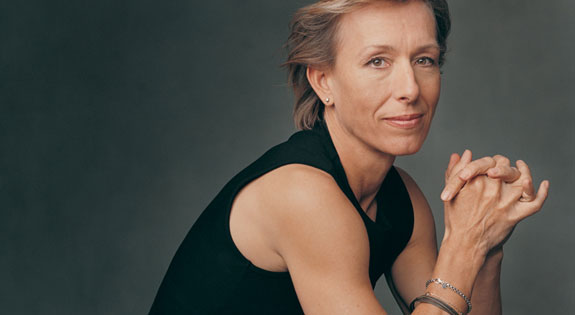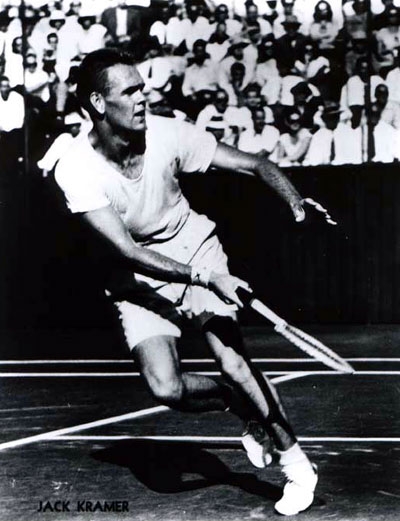In one of the most fascinating women’s final of a Grand Slam tournament in years, Serena Williams won her fifth Australian Open title Saturday, defeating Justine Henin 6-4, 3-6, 6-2 in a renewal of one of the great rivalries in women’s tennis over the last decade.
Williams, the world No. 1 and the defending Australian champion, won the last four games in the match, despite losing a stretch of five straight games and 15 straight points at the end of the second set and the beginning of the third set.
Her win over Henin gave her a 12th major singles title, tying her with the great Billie Jean King for sixth place all-time. Coupled with her victory in the women’s doubles competition Friday with sister Venus Williams now owns 25 career major titles, placing her in ninth place all-time and giving her an argument that, outside of 59-time major winner, Martina Navratilova, is the best – or most complete – female player of the Open era (since 1968).
Said Williams of equaling the number of major singles titles won by King, her former U.S. Olympic coach, ““It’s so cool. To be mentioned in the same breath as her is awesome.”
Williams, who now has an impressive 12-3 record in major singles finals, previously won Australian Open titles in 2003, 2005, 2007 and 2009 and becomes the first player to win five Australian Open women’s singles titles in the Open era, moving her past Steffi Graf, Monica Seles, Evonne Goolagong and Margaret Court. Court, who won an all-time record 62 major titles in singles, doubles and mixed, won an incredible 11 Australian singles titles, but seven of them were in the “amateur” era prior to 1968.
Williams became the first player to win singles and doubles at the Australian Open – something that you rarely see these days in men’s or women’s tennis – since she turned the trick last year Down Under and also back in 2003. Serena also won a Grand Slam tournament double last year at Wimbledon, beating sister Venus in the singles final but pairing with her to win the doubles title.
Henin was competing in only her second tournament after a 20-month retirement and is not officially ranked on the WTA computer – nor will she be when the WTA rankings come out on Monday. A player must have three tournament results to qualify for a ranking so Henin will not have a WTA Tour ranking even after this event since her only other tournament appearance was a runner-up finish to fellow Belgian Kim Clijsters in the Brisbane International earlier this month. Clijsters won the US Open last September in her third tournament of her comeback, and like Henin, was also as an un-ranked wild-card singles finalist. Henin was seeking her eighth major singles title and joined Goolagong as the only other unranked player to play in an Australian final title. Goolagong won the 1977 Australian title without a ranking, coming back to tennis after giving birth to her first child.
Henin now trails her head-to-head series 8-6 against Serena with this meeting being their first in a major tournament final. Williams lost only two games in their last encounter at Miami in 2008 (winning 6-2, 6-0), shortly before Henin announced her shock retirement from tennis while holding the No. 1 ranking.
Henin’s last Australian Open final was in 2006 against France’s Amelie Mauresmo where the Belgian, infamously, retired with stomach pains in the second set. Her first final was in 2004 when she won the title over compatriot Kim Clijsters.
As she has done many times in the past, Williams used the 2010 Australian Open to again showcase her skills from coming back from significant deficits to win. In the quarterfinals against Victoria Azarenka, she trailed a set a 4-1 but came back to win 4-6, 7-6 (4), 6-2.
The following excerpts from the book ON THIS DAY IN TENNIS HISTORY ($19.95, New Chapter Press, www.TennisHistoryBook.com) outlines some of Serena’s other sensational comebacks through the years en route to winning the Australian Open.
January 23, 2003 – Serena Williams fights off two match points and a 1-5 third-set deficit to beat Kim Clijsters 4-6, 6-3, 7-5 to dramatically advance into the final of the Australian Open. Williams advances into the final to meet sister Venus Williams, whom she defeats to clinch her “Serena Slam” run of fourth consecutive major tournament titles. ”It was just an unbelievable battle out there,” says Serena of comeback win. ‘’I thought, ‘I don’t want to lose, 6-1.’ Then I said, ‘I don’t want to lose, 6-2.’ So I just kept fighting. Next thing I know, I came back.”
January 25, 2003 – Serena Williams clinches “The Serena Slam” beating older sister Venus Williams 7-6 (7-4), 3-6, 6-4 to win the Australian Open and complete her sweep of four consecutive major championships. Venus, ironically, is the final-round victim of Serena’s in all four of the major tournaments. Serena joins Maureen Connolly, Margaret Court, Martina Navratilova and Steffi Graf as the only women to hold all four major tournament titles at the same time. “I never get choked up, but I’m really emotional right now,” says Serena in the post-match ceremony. “I’m really, really, really happy. I’d like to thank my mom and my dad for helping me.” The win for Serena places her ahead in her head-to-head series with Venus by a 5-4 margin. Says Venus of her younger sister, “I wish I could have been the winner, but of course you have a great champion in Serena and she has won all four Grand Slams, which is something I’d love to do one day.”
January 27, 2005 – Serena Williams saves three match points in defeating Maria Sharapova 2-6, 7-5, 8-6 in an epic women’s semifinal at the Australian Open. Says Williams, “I’m still the top fighter out there. Those are always the best wins when you’re down match point.” Williams, seeded No. 7, fights off the three match points with Sharapova serving for the match at 5-4 in the third. At 6-6 in the third, Sharapova has three break point chances with Williams serving. After holding her serve for a 7-6 lead, Williams converts on her first match point to advance into the women’s singles final. Of the match points Williams says, “I thought ‘OK, Serena, you’re down match point, but that’s OK, you’ve been down match point before’. It’s a little closer this time so I thought, ‘OK, I could do this.’ When the third match point came around I was like ‘OK, haven’t been in this position before. It’s a new experience for me but I can keep fighting’.” Says Sharapova, “I didn’t take my chances when I could – and that’s what this game is about. If you don’t take your chances you lose. Of course I’m sad but I’ve got a long way ahead of me. I’m 17-years-old and I got to the semifinals of the Australian Open. Nothing’s negative…I think she (Williams) is one of the best competitors out there.”
January 29, 2005 – Serena Williams wins her seventh major singles title, defeating Lindsay Davenport 2-6, 6-3, 6-0 in the women’s singles final at the Australian Open. Williams’ win is her first major since she won Wimbledon in 2003. Says Williams after the match of the suggestion that her career was in decline, “It is a very fashionable way to decline…It’s that much sweeter because people are always wondering about what’s happening to us. It’s been a long way coming back. But I’m almost to my goal, and it feels great. “
January 19, 2007 – Serena Williams wins her first match against a top 10 ranked player in two years, defeating No. 5 seed Nadia Petrova of Russia 1-6, 7-5, 5-3 in the third round of the Australian Open. When presented with this stat in her post-match press conference, Williams laughs and says, “Has it been that long? That’s a terrible stat!” Her last previous win over a top 10 player came at the 2005 Australian Open when she defeated Lindsay Davenport in the final.
January 23, 2007 – Unseeded Serena Williams edges No. 16 seed Shahar Peer of Israel 3-6, 6-2, 8-6 in the quarterfinals of the Australian Open. Says Williams following the match, “I am the ultimate competitor… I’m definitely ready to create some more carnage. I feel absolutely no pressure. I don’t think anyone thought I would get this far, except for me and my mom.” Williams fights off 10 of 13 break points against her serve and comes back from a 1-4 deficit in the final set.
January 27, 2007 – Twenty-five-year-old Serena Williams overwhelms Maria Sharapova 6-1, 6-2 in the women’s singles final of the Australian Open to win her eighth and most unlikely major women’s singles title. Williams, ranked No. 81 and having played only four tournaments in the last year due to a bad knee, becomes only the second unseeded woman to win the Australian title in the Open era, joining Chris O’Neill, who was ranked No. 111 when she won the 1978 Australian Open. “It was an awesome win, because I had so many critics. So many people … saying negative things,” says Williams. “Saying I wasn’t fit, when I felt that I was really fit, and I could last three sets…It’s always like, tell me no and I’ll show you that I can do it. I get the greatest satisfaction just holding up the Grand Slam trophy and proving everyone wrong.” Says Sharapova, “She came out today and she really played flawless tennis.”



